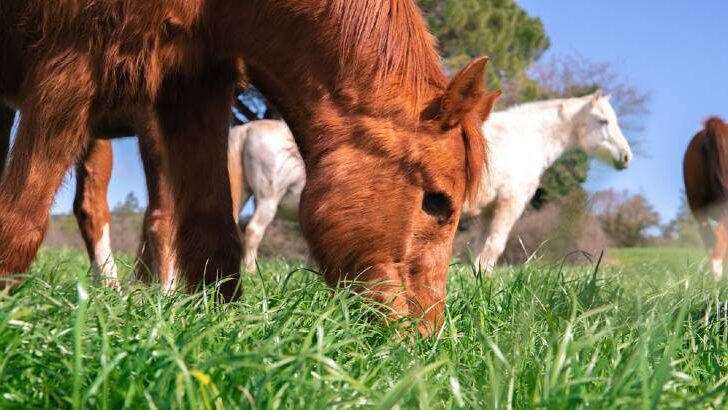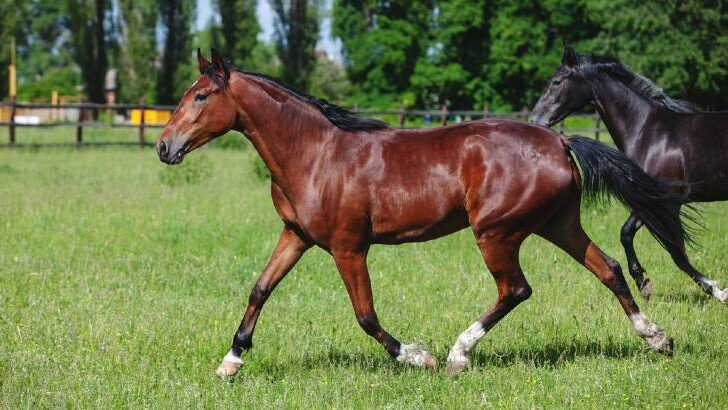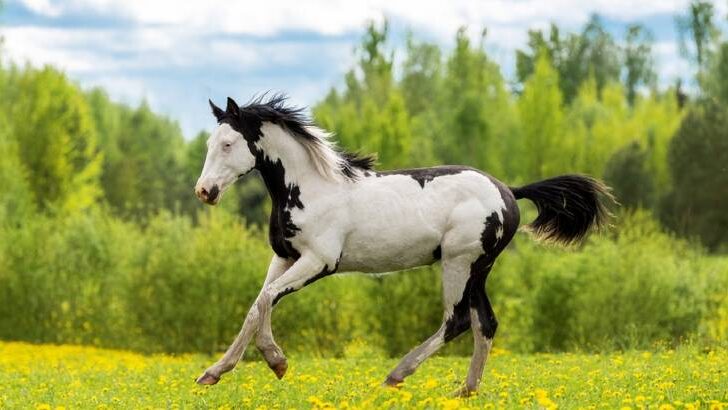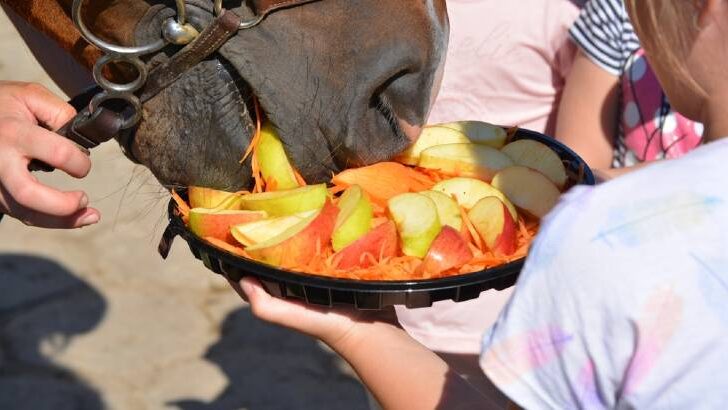Affiliate Disclaimer
As an Amazon Associate I earn from qualifying purchases. It helps me keep the website going. Thank you for your support.
Although they sometimes seem delicate, horses are incredibly resilient creatures when they need to be. Many come back from impossible injuries and carry on with their lives. One of the most impressive comebacks is the horse that loses an eye and still manages to do its job. Losing an eye is tough, and one of the biggest questions is can you ride a horse with one eye?
The good news is yes, you can safely ride a horse with one eye, and they often thrive in many careers. Quality care and ample recovery time are crucial, as is a patient and confident rider. You’ll have to make lifestyle and training adjustments, but it’s quite possible.
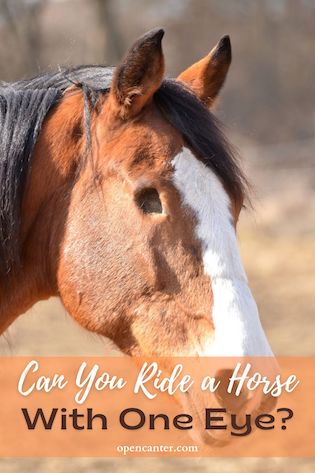
Riding a Horse With One Eye
Many believe that blind or vision-impaired horses are dangerous. The truth is that these horses are no more or less dangerous than any other horse when handled properly. Even a fully sighted horse can still become startled and kick someone or unseat a rider.
Overall, vets, owners, riders, and others across the globe all agree that horses cope incredibly well with the loss of an eye. Even blind horses can live happy, healthy lives and can sometimes be ridden as well!
Once your horse has grown used to their new reality, riding them with one eye isn’t very different from before. There are just a few things you can keep in mind to make things better and easier all around:
- Their ability to see things coming from behind is impaired, so don’t be surprised if they spook more easily.
- Allow your horse to turn their head to see where a curious sound is coming from. Letting them investigate like this can reduce anxiety, prevent spooking, and make them more confident.
- Be patient. Although they adapt well, it’s still a big change. They will naturally gain confidence over time.
- They may require stronger aids when you ask them to turn or move forward. As a rider, you’ll have to adjust to their new needs and way of going. Work with them and you’ll grow together as a team.
Eye Problems in Horses
While genetic abnormalities and birth defects may occur sometimes, surgical removal is the most common reason a horse is missing an eye. There are many potential eye conditions and issues – some cause blindness, and others don’t. Some are treatable, others aren’t. Either way, the eyes are delicate and even the slightest concern shouldn’t be ignored.
Some of the most common things that may result in eye removal include:
- Severe cataracts
- Infection
- Rupture of the eye
- Ulcers
- Cancer
- Equine Recurrent Uveitis, or Moon Blindness
- An accident or other trauma
- Chronic eye disease
Many of these things can be treated, but success rates depend on the severity and the overall health of your horse. Even with treatment options, many owners opt for eye removal when the condition becomes severe or if there is a low chance of recovery.
Although it sounds like a scary and dramatic option, removing a damaged or sick eye is often the best option for the horse. Compared to attempting treatment, there are several benefits:
- Although expensive on its own, multiple treatment attempts and expensive medication adds up over time. Removal may be cheaper in the long run. It usually costs between $1000-2000.
- No chance of recurrence. Things like ulcers, ERU, and even cancer can come back again even after recovery. Removing the eye also removes the chance of a condition returning or flaring up in the future.
- Once fully recovered, your horse will be entirely pain-free.
- Some conditions are not treatable, and this gives the horse a chance at a full recovery.
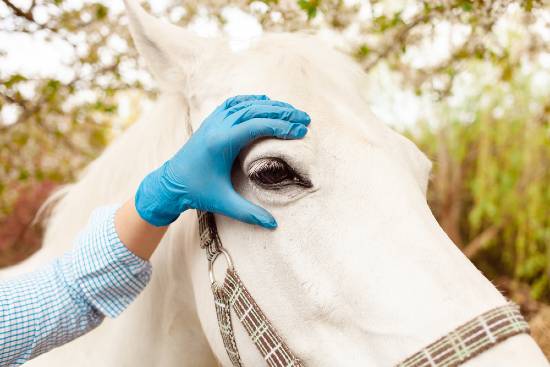
Recovery for a Horse With One Eye
Although the prognosis is often good for a horse undergoing eye removal, recovery is still an important process. The incision itself will often heal within about two weeks, but you’ll still have to care for the eye and watch it closely.
Some things to expect after eye removal surgery:
- A pressure bandage will likely be worn at first, this helps minimize the swelling.
- Swelling underneath the incision is normal and will subside eventually.
- Sutures usually remain for about 14 days before they’re removed.
- You’ll want to monitor it closely for signs of infection, such as excessive heat and swelling beyond what’s expected.
- The procedure itself takes less than an hour but usually requires an overnight stay at the clinic.
Often, eye removal is more upsetting and traumatic for the owner than for the horse. When done correctly, it’s a fairly painless procedure for the horse. After a few weeks of recovery, their life can return to relative normality. The worst part may be getting used to what they look like without their eye!
Life After Eye Removal
Once a horse is fully recovered from their surgery, they’re often able to return to their previous job! Not only can you ride a horse with one eye, but many one-eyed horses are seen competing at high levels. They compete in eventing, show-jumping, barrel racing, foxhunting, and more.
This is because the rest of their body is still fully functional. And unlike humans, horses don’t require two eyes for proper depth perception. Hence why a one-eyed horse can jump around a course just as well as a horse with both eyes.
Of course, to ride a horse with one eye will take a bit of adjustment for both of you. Your horse will have to get used to his new reality and re-learn how to navigate the world. He’ll have to start turning his head or even his whole body to see what’s happening on his blind side, for instance.
He may become a little spookier and jumpier in the weeks or months following eye removal, as he gets used to hearing things without seeing them.
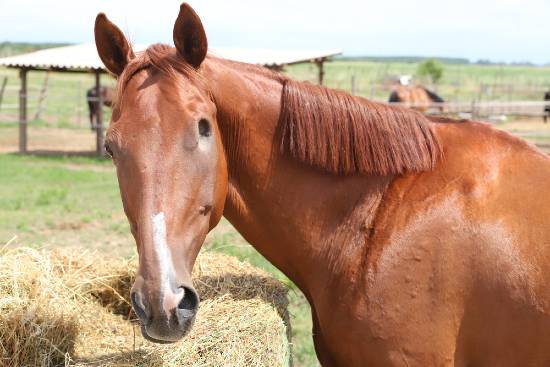
General Tips for Keeping a Horse with One Eye
- You don’t have to isolate them, but small, quieter groups of horses or a single companion might be best. Blind and vision-impaired horses often fall to the bottom of the pecking order, making them more vulnerable to injury and bullying by other horses.
- Keep their feed and water buckets against a solid wall if possible. This helps them find it easily and they’ll always know where it is.
- Keep a hand on their side, flank, or shoulder as you’re moving around their blind side. This tells them exactly where you are so they don’t become startled and hurt you or themselves.
- Monitor their other eye closely for potential issues and always call your vet if you suspect anything may be wrong.
- Teach them additional verbal cues if necessary to help them understand what you want, both on the ground and under saddle.
- Approach them only from their sighted side for the first little while.
- Avoid trimming their whiskers as these help them navigate the world and prevent them from bumping into things.
How to Spot Eye Problems
Because the eyes are so delicate and prone to problems, we must remain vigilant with our horses. It’s important to always pay attention to the condition and state of our horse so we know what’s normal and what’s concerning.
For example, maybe you know your horse is sensitive to dust and their eyes may water temporarily on a particularly dusty day. This alone is not necessarily a cause for concern, provided no additional symptoms are present.
On the other hand, if your horse’s eyes never normally water and suddenly they do one day, there’s a reason.
Some important things to watch for when it comes to your horses’ eyes:
- Excessive and prolonged swelling
- Holding their eye shut due to pain or sensitivity
- Redness or bloodshot in the whites
- Changes in the color of the eyeball itself
- Dark or cloudy spots on the iris
- The horse is rubbing their eyes excessively on fence posts, walls, or other surfaces. Rubbing may not indicate a serious issue in itself, but too much can lead to things like lacerations or ulcers.
- Eyelashes are turned downward. Healthy eyes will have eyelashes pointing out or slightly up.
Even if something doesn’t seem sinister at first, you’re always better to be safe than sorry when it comes to the eyes. Some conditions can worsen within a day or two and then you’re looking at a much more serious problem.
If you’ve contacted your vet for a suspected issue, wait until they arrive to do anything about the eye. Well-intentioned lotions or drops could end up making things worse depending on the diagnosis. What you can do is make sure the area is kept clean. Do so gently and with non-irritating substances like simple water. Then, keeping a fly mask on will help reduce additional irritation.
Final Thoughts
Eye removal surgery can be scary and a horse with one eye certainly has a unique look. But, eye removal is a pretty common solution to many serious conditions. Most horses recover well and life returns more or less to normal. So, yes, you can ride a horse with one eye. Your horse will take the procedure in stride, and you can rest easy knowing their pain is gone.

